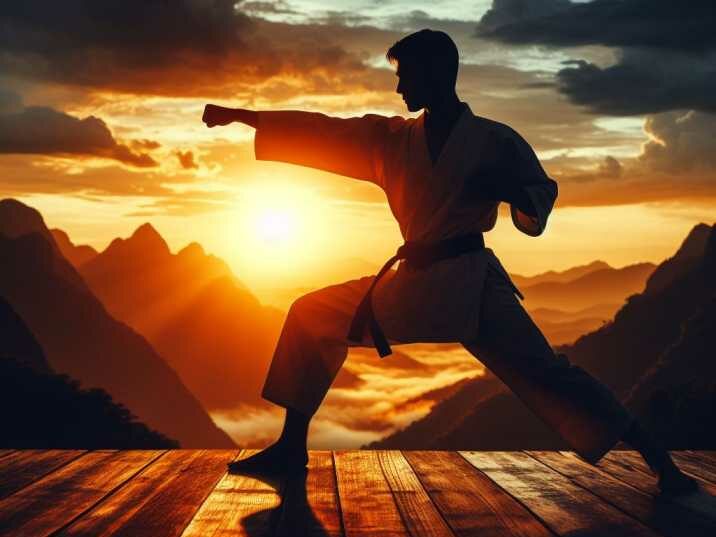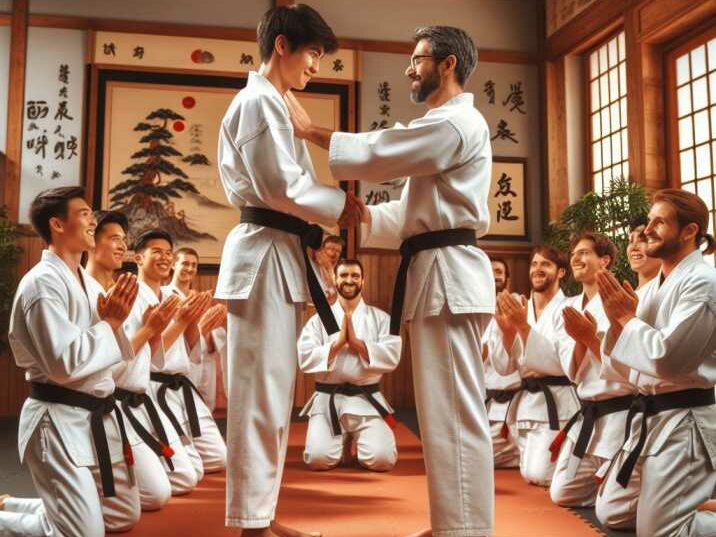Introduction:
Table of Contents
How long takes to learn karate
Karate, a martial art that has transcended generations, holds a mystique that captivates enthusiasts worldwide. Aspiring martial artists often embark on this journey with a burning question: “How long takes to learn karate?” In this comprehensive guide, we delve into the intricate layers of mastering karate, uncovering the time commitment, challenges, and rewards.

The Path to Proficiency: How long takes to learn karate
Understanding the Basics (Months 1-6)
The initial phase of karate training focuses on building a solid foundation. Students familiarize themselves with fundamental stances, punches, and kicks. Regular practice, usually two to three times a week, is crucial to mastering these basic techniques. In this foundational period, discipline and consistency lay the groundwork for future success.
Progressing Through Belt Levels (Months 6-24)
Karate utilizes a belt system to signify a practitioner’s skill level. Advancing through these levels requires dedication and practice. Achieving higher belts demands a nuanced understanding of techniques, improved physical conditioning, and a grasp of karate philosophy. Students may begin to spar during this phase, honing their practical skills.
Intermediate Mastery (Months 24-48)
The intermediate stage witnesses a deeper exploration of karate’s intricacies. Kata, choreographed patterns of movement, become central to training. Students refine their techniques, and sparring intensifies. It’s during this period that individuals truly internalize the principles of karate and cultivate their unique style.
Advanced Training and Specializations (Months 48+)
The advanced stage is where true mastery unfolds. Students, now experienced practitioners, may choose to specialize in specific aspects of karate, such as weapons training or advanced self-defense techniques. Achieving a black belt is a significant milestone, but the journey doesn’t end there. Continuous learning and refinement persist as practitioners strive for excellence.
Challenges Along the Way:
Mastering karate is a demanding endeavor, and challenges are an inherent part of the journey. From physical stamina to mental resilience, practitioners must navigate obstacles to progress. Injuries, plateaus in skill development, and the occasional frustration are all part of the process. However, overcoming these challenges contributes to the growth and development of a seasoned martial artist.
Rewards of Karate Mastery:
Karate offers a myriad of physical, mental, and emotional benefits. Physical fitness, enhanced self-discipline, improved focus, and heightened self-confidence are just a few rewards. The journey of mastering karate instills valuable life skills, fostering resilience, perseverance, and a deep sense of respect for oneself and others.

Information-Based Table:
How long takes to learn karate
| Phase | Time Frame | Key Focus |
|---|---|---|
| Understanding Basics | Months 1-6 | Fundamental stances and techniques |
| Belt Advancement | Months 6-24 | Progression through belt levels |
| Intermediate Mastery | Months 24-48 | Deepening understanding of kata |
| Advanced Training | Months 48+ | Specializations and continuous learning |
Conclusion
The journey of learning karate is a transformative odyssey, marked by discipline, perseverance, and self-discovery. As practitioners progress through the phases, they not only master a martial art but also cultivate a mindset that extends beyond the dojo. The question of how long takes to learn karate is subjective, as individual progress varies. What remains constant is the invaluable experience gained along the way.
FAQs:
- How long does it take to earn a black belt in karate? Achieving a black belt typically takes around 4 to 5 years of dedicated practice, but this can vary based on the individual’s commitment and the dojo’s requirements.
- Is karate suitable for all ages? Yes, karate is adaptable for all ages. Many dojos offer specialized classes for children, adults, and seniors.
- Do I need prior fitness experience to start learning karate? No, karate welcomes practitioners of all fitness levels. The training itself contributes to improved physical fitness over time.
- How often should I train to progress effectively? Training two to three times a week is generally recommended for consistent progress. However, individual commitment plays a significant role.
- Can I learn karate through online classes? While online resources can supplement learning, traditional in-person classes with a qualified instructor are crucial for proper technique and feedback.
- Is sparring mandatory in karate training? Sparring is a valuable component of karate training but is often introduced gradually as students progress to ensure safety and skill development.
- Can karate help with self-defense? Yes, karate equips practitioners with practical self-defense skills, teaching them how to protect themselves in various situations.
- What are the mental benefits of practicing karate? Karate fosters mental discipline, focus, and resilience. It encourages a positive mindset and enhances overall mental well-being.
- Are there different styles of karate? Yes, various styles of karate exist, each with its unique techniques, forms, and philosophy. Common styles include Shotokan, Wado-Ryu, and Goju-Ryu.
- Do I need to participate in competitions to advance in karate? Competitions are optional, and not all practitioners choose to participate. Advancement is primarily based on skill development and belt tests.
- What role do katas play in karate training? Katas are choreographed patterns of movement that serve as a structured way to practice techniques and enhance muscle memory.
- Is karate only about physical strength, or does it involve mental training too? Karate is a holistic martial art, encompassing both physical and mental aspects. Mental training is integral to developing focus, discipline, and a strong mindset.


